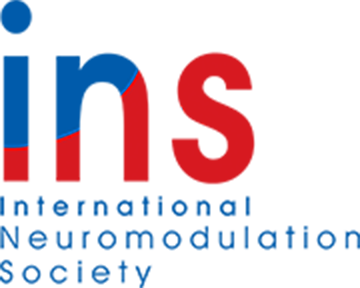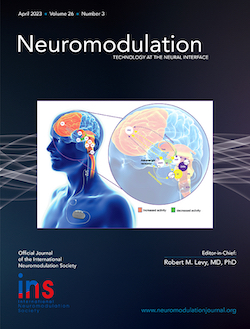A Message from the President
Dear INS members and friends,
The year 2016 marked my first full year as president of this wonderful and uniquely valuable society that represents multiple talents, but a united purpose, across the globe.
It has always been a dynamic society since its start in 1989, and that has continued to be the case.
One of the firsts we have accomplished in 2016 is the start of active endeavors in our newly formed, focused committees. For instance, the Education and CME and Young Neuromodulator committees are teaming on the development of a core curriculum for neuromodulation.
In addition, this year, we held our first regional Interim Meeting in Chengdu, China in August in conjunction with the INS China chapter and the Chinese Congress of Neurological Surgeons. With my fellow co-chairs, Drs. Guoming Luan and Chao You of the Chinese Neuromodulation Society, we welcomed more than 500 delegates. I commend them and Drs. Wei Wang, Yuguang Guan, Peng Li, Tianfu Li, Xianlun Zhu as well as Lily Chen, CNMS Secretariat for organizing and hosting a wonderful meeting. Our excellent scientific exchange drew upon presentations from a strong faculty of physicians and investigators from China and beyond. We will repeat our regional Interim meeting in 2018 and look forward to proposals from our worldwide chapters on potential locations. This collaboration with the INS and our members builds relationships and expands our goal of global access to neuromodulation therapies.
In addition to this global expansion of our mission and partnerships we have seen excellent meetings around the globe in the past 12 months: The 19th Annual Scientific Meeting of the North American Neuromodulation Society (NANS), in December 2015; the 11th Annual Scientific Meeting of the Neuromodulation Society of Australia and New Zealand in March 2016; the III Congress of the Brazilian Neuromodulation Society in collaboration with the Argentinean Neuromodulation Society and Brazilian Society of Stereotactic and Functional Neurosurgery in May 2016; the Joint Meeting of NANS-Neural Interfaces in June 2016; the Nordic Neuromodulation Society Annual Meeting in September 2016; the Canadian Neuromodulation Society 9th Annual Meeting in September – October 2016; the Annual Scientific Meeting – Spanish Chapter of the INS, Sociedad Española de Neuromodulación, in October 2016; and annual scientific meetings of the Italian, U.K./Ireland, German, Swiss, and French neuromodulation societies as this newsletter entered production this month.
We are eager to continue the scientific exchange when we meet next year in Edinburgh. I encourage all of you to discover what this fascinating location and our event have to offer. The scientific program is being finalized now and the registration system has just launched. All INS members will receive a special discounted registration rate.
In a more near-term "virtual" opportunity, I also invite you to see the latest online Expert Panel -- a web-based discussion that takes place on the INS website's Members Only Global Discussion Forum. The session began Nov. 1 regarding "Spasticity and Neuromodulation" and is being addressed in a holistic manner by co-moderators Konstantina Petropoulou, MD, PhD, and Michael Saulino, MD, PhD. We are lucky to have knowledgeable and generous members such as these to offer such uniquely valuable member benefits.
The next Expert Panel will be led from Jan. 23 to Feb. 6, 2017 by INS Director-at-Large Leonardo Kapural, MD, PhD on "Pelvic Pain and Neuromodulation".
By that time, the INS website will have a new, mobile-friendly, interface. That revitalization has been a team project between Public Education and Website Manager Nancy Garcia and the INS Public Education Structure Subcommittee led by co-chair Kaare Meir, MD, PhD, with contributions from members of the Public Education Committee in consultation with the Executive Board and Executive Director Tia Sofatzis.
The Executive Officers and I are very pleased with this endeavor, and hope the updated interface will be a boon to delegates as we prepare for the 2017 congress, and will facilitate your connections to fellow members as well as everything else the society has to offer. The robust website includes resources for members, daily news briefs, the Global Events Calendar, clinical trials listings, and customizable content for patients.
In closing, I want to thank you again for all you do to keep this society a thriving and inspiring feature of our professional lives.
With best regards,
Timothy Deer, MD
President of INS
More Than 500 Delegates Attended the 1st Interim Meeting in China in August
The INS held the first interim meeting in Chengdu, China in August in collaboration with the Chinese Neuromodulation Society. Many members and leaders of the INS served as faculty at the meeting. Overall, the faculty represented six countries and four continents. The presentations covered the full breadth of neuromodulation topics: epilepsy, movement disorders, chronic pain, cardiovascular disease, motor recovery after stroke, vegetative state, psychiatric disorders, and multiple disease processes.
The meetings are organized to bring neuromodulation education to physicians in more remote parts of the world, who may not be able to travel to the INS biennial congress.
INS and CNMS Interim Meeting Faculty and Organizers

Front row from left to right: Yehan Wang, Chris Kao, Ashwini Sharan, Ali Rezai, Konstantin Slavin, Robert Levy,
Timothy Deer, Guoming Luan, Elliot Krames, Jung Kyo Lee, and Takamitsu Yamamoto.
Back row from left to right: Luming Li, Limin Liao, Jianguo Zhang, Jiande Chen, Tianfu Li, Shizhong Zhang, Wei Wang,
Zhipei Ling, Xianming Fu, Mingxia Li, Baoguo Wang, Xianlun Zhu, and Yuguang Guan.

A Special Thanks to Our Many Mentorship Survey Respondents
More than 250 members completed the mentorship survey of the Young Neuromodulators Committee. The completed surveys provided wonderful feedback. We truly appreciate the enthusiastic response and important insights that respondents shared.
The Committee Chairs are now analyzing the results to identify how the INS can address the challenges to creating mentorship programs, and connecting mentors to mentees. Many members stepped forward to participate as mentors and mentees and the committee will be following up.
We look forward to this exciting, valuable, and rewarding new feature of membership.

Selection of Proposed Congress Scientific Sessions to be Announced Soon; Scientific Abstract Submissions of Original Work Will Be Due Jan. 9, 2017
Many thanks to all who submitted scientific proposals for the INS 13th World Congress from May 27 to June 1, 2017 in Edinburgh. Your thoughtful suggestions of potential scientific sessions regarding the wide spectrum of neuromodulation therapies helps the INS provide a robust scientific program of value to peers around the world.
Please look for an announcement about the program after it is finalized.
In the meantime, the Scientific Program Committee extends its gratitude to everyone who submitted proposals. If you were unable to submit a proposal, or if your suggestion does not make it into the program, we encourage you to submit your work as an abstract for oral and/or poster presentation.
The abstract submission system is now live, and the deadline to submit abstracts of your work is Jan. 9, 2017.
To access the abstract submission system please visit the INS 2017 ScholarOne Abstracts site. Download the instructions for authors here.
Abstract categories encompass basic science, neural engineering, socioeconomics, and existing clinical therapies as well as potential future technologies. We welcome submissions on the following:
• Neuroprosthetics and Neural Engineering
• The Brain (movement disorders, psychiatric disorders, and cognitive disorders)
• The Spine (pain, spasticity, and movement disorders)
• Headache
• The Peripheral Nervous System
• Cardiovascular Disorders
• Gastrointestinal Disorders
• Genitourinary Disorders
• Systemic Disease
• Non- and Less-Invasive Brain Stimulation
• Neuro-regeneration
The INS Executive, Biennial Congress, and Education and CME Committees with members of the Neuromodulation Editorial Board will rigorously review each submission, and will select the strongest work for oral presentation, in addition to traditional poster presentation. The content of abstracts must promote improvements or quality in healthcare and not a specific proprietary business or commercial interest. Presentations must avoid commercialism and may not contain any commercial messaging. All accepted abstracts will be published on the Society’s website and in the online version of the INS journal, Neuromodulation: Technology at the Neural Interface.
We encourage you to indicate on the submission form if you wish for your abstract to be considered for the INS’s best abstract competition. The top five abstracts will be recognized for their quality, originality and ingenuity in basic or clinical science or neural-engineering. Primary authors will have an opportunity to enter the competition during the submission process. Award recipients will be notified in advance of the Congress, and will be recognized on stage during the INS General Assembly of Members on the 30th of May. In addition to this honor, the primary author recipients will be refunded their congress registration fees. To qualify for the competition, the primary author must be a current member of the INS and must have registered for the main congress.

Revitalized Spanish Chapter, Sociedad Española de Neuromodulación, Holds Scientific Meeting in Seville
In March, Prof. Antonio Pajuelo, MD, organized an initial meeting to reformulate the Spanish Chapter of the INS and lay the groundwork for the chapter's annual meeting, which was held Oct. 20 - 22, 2016, in Seville, Spain.
In calling the meeting, he said the main purpose would be to establish the basis for the quality of neuromodulation therapy in order to justify its clinical use and funding. The meeting had an international faculty. Both pain and neurosurgical perspectives were well-represented in the scientific program and the delegation of approximately 70 attendees.
The first day included presentations concerning government technology assessment agencies (Agencia de Evaluación de Tecnologías Sanitarias de Andalucía - AETSA, and NICE). That was followed the next morning by presentations about current and emerging indications for deep brain stimulation and vagus nerve stimulation. Next, invited faculty presented the state of neurostimulation therapy, such as dorsal root ganglion stimulation and newer waveforms in neurostimulation for chronic pain. On the final day, chapter projects were presented, which included a national register of neurostimulation (RENE), and setting a timetable for elections and formalization of the chapter.
Prof. Pajuelo did an excellent job organizing the event where there was a strong sense of camaraderie. This is an exciting time for neuromodulation in Spain.

Contributors to Scientific Program Earn Thanks for a Job Well Done
A special thanks goes to the volunteers and members of the Executive, Biennial Congress, and Education and CME Committees who have assiduously worked to review proposals and develop the scientific program of the INS 13th World Congress. With careful thought to the breadth and depth of the program, we shall call upon a diverse faculty for the 3.5 days of the 13th World Congress's scientific program, cadaver workshop and two days of pre-conference sessions.
The executive officers are impressed with the committee members' efforts and anticipate that delegates will find the meeting to be immensely rewarding for staying abreast of the field.

Neurotech Leaders Forum Takes Place in San Francisco
In October, the INS exhibited at the well-attended Neurotech Leaders Forum, which is now in its 16th year and had nearly 200 registrants. The meeting, held on the outskirts of the San Francisco International Airport, focuses on emerging neuromodulation technologies and startups, as well as the finance industry, government research funding, the frontiers of bioelectronic medicine, and digital health.

|







